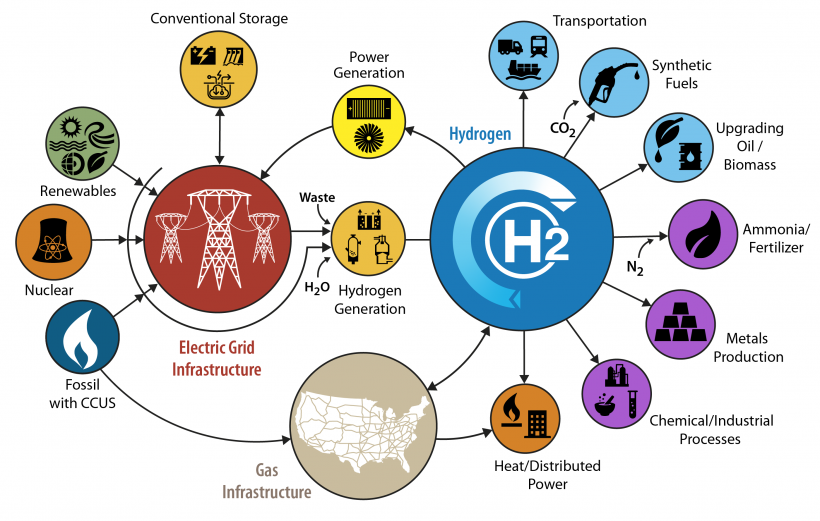Innovative and clean hydrogen technologies harness the natural abundance and versatility of hydrogen to provide options across multiple energy sectors including transportation, electricity, and manufacturing. Advancements in hydrogen technologies support a growing economy and thriving workforce, and contributes to a cleaner and more resilient energy future.
Indiana's Regional Collaboration
On September 19, 2022, Indiana Governor Eric J. Holcomb announced a regional Midwest partnership to pursue the acceleration of a robust hydrogen economy. The Midwest Hydrogen (M-H2) Coalition is a multi-state collaboration committed to the investment and development of hydrogen markets, supply chains, and workforce opportunities. Indiana's strengths in advanced manufacturing, engineering, and research and development will be uniquely valuable toward this initiative with engagement from industry, academic, and community partners. The efforts of the Midwest Hydrogen Coalition will result in strengthening the economy and workforce, enhancing energy security, and improving public health outcomes.
Click here to read Governor Holcomb's announcement and here to read the Midwest Hydrogen Coalition MOU.
Read the statements by each Governor here.
About Hydrogen
Hydrogen, the smallest and the most abundant element on earth, is clean and naturally occurs with other elements, such as water. Hydrogen has high energy content for its light weight, which makes it very attractive for new and emerging energy technologies. Hydrogen can carry energy from one place to another like electricity, but unlike electricity, it can be stored for long periods of time.
One of the first uses of hydrogen was by NASA in the 1950s as a rocket fuel. Today, the agriculture sector is a primary and large user of hydrogen through the use of ammonia (NH3) as a fertilizer. Other commercial, industrial, and manufacturing end-use opportunities use hydrogen and could benefit from increased hydrogen technologies, include oil refining and steel production.
To learn more about hydrogen, check out the U.S. Energy Information Administration.
Potential Uses of Hydrogen
There are many potential energy applications for hydrogen technologies, such as:
Hydrogen fuel cells. This technology combines hydrogen and oxygen to produce electricity and water, which can be used in transportation as an alternative fuel. Much of the ongoing hydrogen fuel cell research and development within the transportation sector is about incorporation into larger vehicles and freight, including shipping trucks, boats, rail, and aviation.
Power generation and heat. Hydrogen may be used as a gas to generate electricity with natural gas power plants (either simple or combined-cycle) or to heat buildings similar to conventional natural gas. Hydrogen can be blended with natural gas resulting in cleaner energy without additional costs of new infrastructure.
Energy storage. Researchers are also investigating how hydrogen might be stored to provide on-demand electricity. Energy storage is an important component to Indiana's energy future to serve as back up for short-term electricity disruptions and to fill gaps in electricity generation from intermittent resources like wind and solar.

